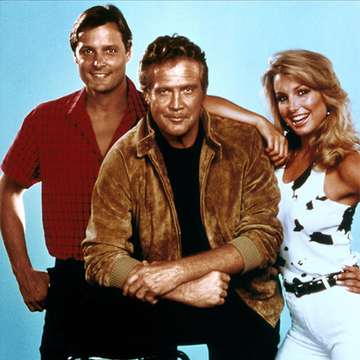"One of the problems with science fiction," said Ridley Scott back in 2012, ahead of the release of Prometheus, "is the fact that everything is used up. Every type of spacesuit, every type of spacecraft is vaguely familiar. The corridors are similar, the planets are similar. So what you try to do is lean more heavily on the story and the characters."
Great science fiction has always done just that. So why have a recent string of releases shown less interest in the story than the spaceships? Is sci-fi a genre in trouble?
This year, Netflix films Mute and The Titan have received abysmal reviews, the former being termed a "catastrophically misjudged riff on Blade Runner" with another reviewer asking simply "what did I just watch?". This despite a cast that included recent Emmy winner Alexander Skarsgård and being directed by Duncan Jones of the stunning 2009 science fiction film, Moon.
In the latter, Sam Worthington plays a former pilot undergoing genetic experimentations to adapt to life on one of Saturn's moons after earth becomes unliveable. The premise of the film falls apart at the gentlest of prods (why mutate humans to live on a new planet when you could adapt them to live on earth's new climate?) and the writing is painful throughout.
Netflix have also rebooted sixties series Lost In Space to a lukewarm reception and Alex Garland's Annihilation, based on the best-selling book by Jeff VanderMeer, was embroiled in a whitewashing controversy and pulled out of a cinematic release in the UK. In any case, the film received middling reviews, something particularly disappointing in the light of Garland's extraordinary 2014 sci-fi film Ex Machina. Writing in The Atlantic, Christopher Orr called it "a beautiful heap of nonsense" noting that it had "the feel of brainy, high-end science fiction, but ultimately neither the underlying structure nor content."
And yet you don't have to go back many years to find, in films such as Arrival (2016), Inception (2010) or Interstellar (2014), computer generated galaxies and aliens that aren't a smokescreen for poorly developed characters or a bad script. Amy Adams performance in Arrival was particularly gripping, as was the film's central 'what if' premise about how earth would respond if descended upon by alien lifeforms, and the global conflict that might ensue.
Science fiction triumphs when it reminds us what is at risk of being lost or left behind on earth. New York Times critic A.O. Scott noted that Interstellar is about "longing for home" adding that it "answers an acute earthly need, a desire not only for adventure and novelty but also, in the end, for comfort."
At this year's Oscars, satirical horror Get Out won a best screenplay award and fantasy fairytale The Shape of Water picked up five including best director and best picture. Both represented a win for genre films with brains, proving such a thing can be successful. Smart horror A Quiet Place, recipient of outstanding reviews and the only film of 2018 thus far to make over $50m on its opening weekend, is shaping up to be another example.
As Arrival star Jeremy Renner said in speaking to Esquire about 'grown-up' genre films, "I feel like Hollywood spoon-feeds people a lot of dumbed-down material. Yet there are a lot of smart people out there who want to be entertained."
And yet when it comes to sci-fi, the most recent slew seem to have forgotten that it doesn't matter if you believe the spaceships are real if you can't believe the characters on them are.
All of which, of course, could just be an anomaly - a genre on a bad run, as horror was in the early 00s before hitting a hot streak, or simply a case of over-saturation as we've witnessed recently with dystopian dramas.
Or perhaps there's a wider reason why sci-fi isn't hitting the mark anymore. It would be remiss in this debate not to mention the case of Blade Runner 2049. Exhaustively hyped for months, the film ended a box office flop, failing to reach the $400m it needed to break even. This despite the fact it was both a visual blockbuster and an example of intelligent storytelling (with plenty of nostalgia appeal thrown in to boot). As Guardian film critic Ben Child put it:
"Villeneuve’s film is a rare example of the blockbuster with brains, a hugely entertaining romp through the dystopian future that also functions properly as an existential thinkpiece. It was the brightly-sparking blue touch paper for a whole new universe of intelligent big screen sci-fi that we’ll now never get to see."
How was it that this film failed? Is it because the present day is too consuming and unpredictable to leave space in our imaginations for visions of the future? Or that our relationship with technology has changed so fundamentally?
Ridley Scott's original Blade Runner was released in 1982, five years after the invention of the mobile phone and seven years before the world wide web. Technology and the future it might give us was still a mystifying subject back then. Today we track the rapid developments in our gadgets on a daily basis, consuming tech like just another part of popular culture.
What's more, with tech companies accused of meddling in elections and harvesting our data, evidence amassing of the deteriorating effects of mobile phones on our brains and foreign cybercriminals hacking our healthcare services, there is enough we're trying to figure out about the moral and societal implications of technology right now without supposing problems we'll have to figure out in the future.
However much truth there is in all of that, it is clearly no longer enough for science fiction to wow us with a computer generated spaceship spiralling through space, or offer the self-evident truth that technology and science can be used for evil ends by irresponsible institutions.
There is one, stand out exception to the 'sci-fi has gone rubbish' argument, and that is Charlie Brooker's Black Mirror - a critical and commercial home run for Channel 4 and then Netflix since 2011. The show is about where technology and science might lead us, but the special effects and hand-wringing are secondary to brilliant characters and sharp writing. Every episode, no matter how outlandish, is moving and profound because it focuses on human at the heart of it all. When sci-fi as a whole remembers that lesson, the good times will surely return.














